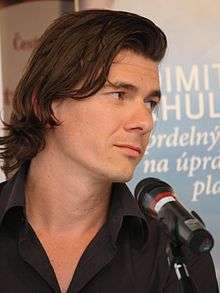Dimitri Verhulst
| Dimitri Verhulst | |
|---|---|
 Dimitri Verhulst | |
| Born |
2 October 1972 Aalst, Belgium |
| Nationality | Belgian |
| Occupation | poet, writer |
Dimitri Verhulst (born 2 October 1972) is a Belgian writer and poet. He is best known for his novels Problemski Hotel and The Misfortunates.
Biography
Verhulst comes from a broken home and spent his later childhood in a foster home.[1] He grew up Catholic.[2] As a writer, he made his debut in 1994 with the self-published Assevrijdag.[1] In 1999 his first official publication appeared, a collection of stories about his youth, De kamer hiernaast, for which he was nominated for the NRC Literair Prijs.[1] The novel Niets, niemand en redelijk stil (2000) is also about his youth, but De verveling van de keeper (2002) signals a change in form and is characterized by great social and political involvement.[3] In 2001, Verhulst published Liefde, tenzij anders vermeld, a collection of poetry.
His breakthrough to the general public was in 2003, with Problemski Hotel (translated as Problemski Hotel), about residents of an asylum-seekers' centre in Arendonk (Belgium). The book was translated into more than ten languages.[3] Belgian filmmaker Manu Riche made a movie based on the book, which is to premiere in January 2016.[4] In 2006 his novel De helaasheid der dingen (translated as The Misfortunates) was published, and also the novella Mevrouw Verona daalt de heuvel af (translated as Madame Verona Comes Down the Hill). In 2008 Godverdomse dagen op een godverdomse bol ("Goddamn days on a goddamn globe") was published, for which Verhulst won the 2009 Libris Prize;[1][2] Verhulst wrote the 2015 Boekenweekgeschenk, De zomer hou je ook niet tegen.[2] His 2015 novel Bloedboek ("Bloodbook"), a retelling of the Pentateuch, was praised in De Morgen for its amusement value;[5] in the Dutch daily Trouw it was called a "gruesome bible", with the interviewer questioning Verhulst about his use of terms such as "Final solution" in retelling the first five books of the bible. Verhulst responded that he used the "worldwide language of genocide".[2]
Verhulst publishes on a regular basis in the literary journals Underground, Nieuw Wereldtijdschrift and De Brakke Hond. For Underground he is also an editor.[1] He lives and works in Huccorgne.[6]
Writing style
Verhulst's writing style has been characterized as sarcastic but compassionate. His use of language can be explicit and hilarious.[1] His writing is controversial, and Verhulst was twice summoned to court.[1] Belgian writer Louis Paul Boon is a source of inspiration for Verhulst.[1]
Bibliography
- Assevrijdag (1994)
- De kamer hiernaast (1999)
- Niets, niemand en redelijk stil (2001)
- Liefde, tenzij anders vermeld (2001, poetry)
- De verveling van de keeper (2002)
- Problemski Hotel (2003)
- Dinsdagland (2004)
- De aankomst in de bleke morgen op dat bleke plein (Aalst) (2005, play)
- Yerma vraagt een toefeling (2005, translation of Yerma by Federico García Lorca)
- Boekendiefstal is een zegen voor de middenstand (2005)
- De helaasheid der dingen (2006, The Misfortunates; there is also a 2009 film version called The Misfortunates)
- Mevrouw Verona daalt de heuvel af (2006, Madame Verona Comes Down the Hill)
- Godverdomse dagen op een godverdomse bol (2008)
- De laatste liefde van mijn moeder (2010)
- De zeven laatste zinnen (2010)
- Monoloog van iemand die het gewoon werd tegen zichzelf te praten (2011)
- De intrede van Christus in Brussel (2011, Entry of Christ into Brussels)[7]
- De laatkomer (2013)
- Kaddisj voor een kut (2014)
- De zomer hou je ook niet tegen (2015, Boekenweekgeschenk)
- Spoo Pee Doo (2016)[8]
Awards
- Publieksprijs Gouden Uil for De helaasheid der dingen (2007)
- De Inktaap for De helaasheid der dingen (2008)
- Beste Boek 2008 Humo's Pop Poll for Godverdomse dagen op een godverdomse bol (2009)
- Libris Literatuurprijs for Godverdomse dagen op een godverdomse bol (2009)
See also
References
- 1 2 3 4 5 6 7 8 "Dimitri Verhulst | Literair Nederland". Literairnederland.nl. 1974-04-25. Retrieved 2014-05-30.
- 1 2 3 4 Akkerman, Stevo (7 November 2015). "De gruwelijke Bijbel van Dimitri Verhulst". Trouw. Retrieved 8 November 2015.
- 1 2 "Verhulst, Dimitri – Schrijversgewijs". Schrijversgewijs.be. 2008-09-23. Retrieved 2014-05-30.
- ↑ "'Problemski Hotel': Manu Riche verfilmt Dimitri Verhulst". Humo (in Dutch). 13 October 2015. Retrieved 8 November 2015.
- ↑ Leyman, Dirk (4 November 2015). "Bloedboek van Dimitri Verhulst: Amusement verzekerd ***(*)". De Morgen (in Dutch). Retrieved 8 November 2015.
- ↑ "'Het was meteen koekenbak tussen ons' – De Standaard". Standaard.be. 2009-03-28. Retrieved 2014-05-30.
- ↑ "Book – Entry of Christ into Brussels – Letterenfonds". Letterenfonds.nl. Retrieved 2014-05-30.
- ↑ http://www.atlascontact.nl/internationale-publicatie-nieuwe-roman-dimitri-verhulst-over-de-aanslagen-in-europa/ (in Dutch)